What Is A Snapchat Lawsuit?
- Last Updated: July 14th, 2025

Attorney Jessica Paluch-Hoerman, founder of TruLaw, has over 28 years of experience as a personal injury and mass tort attorney, and previously worked as an international tax attorney at Deloitte. Jessie collaborates with attorneys nationwide — enabling her to share reliable, up-to-date legal information with our readers.
Legally Reviewed
This article has been written and reviewed for legal accuracy and clarity by the team of writers and legal experts at TruLaw and is as accurate as possible. This content should not be taken as legal advice from an attorney. If you would like to learn more about our owner and experienced injury lawyer, Jessie Paluch, you can do so here.
Fact-Checked
TruLaw does everything possible to make sure the information in this article is up to date and accurate. If you need specific legal advice about your case, contact us by using the chat on the bottom of this page. This article should not be taken as advice from an attorney.
Key takeaways:
- Snapchat lawsuits often involve allegations of the app being used for illegal drug sales to minors, specifically deadly fentanyl-laced pills.
- Privacy concerns have led to legal action against Snap Inc., such as in Illinois, where a $35 million settlement was reached over biometric data misuse.
- Victims and families pursue these lawsuits, seeking justice and changes in how social media platforms monitor content and protect users, especially young adults.
Overview of the Snapchat Lawsuit
On this page, we’ll provide an overview of the Snapchat lawsuit, identifying evidence specific to Snapchat’s platform issues, how to bring forward a Snapchat-related lawsuit, and much more.
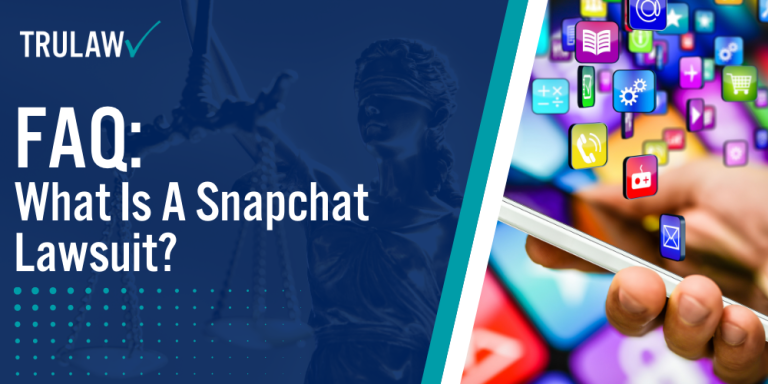
Intro to the Snapchat Lawsuit
The Snapchat lawsuit surfaced when allegations pointed to the company’s handling of sensitive user data.
Effective organization and consistency are applied to ensure the details of the Snapchat lawsuit are comprehensible:
- Alleged Violation: The crux of the lawsuit hinges on the illegal collection of biometric data.
- Biometric Information: Facial recognition features are at the heart of the privacy concerns.
- Legal Framework: The Illinois law strictly governs how companies use such sensitive data.
- Snap Inc.’s Response: Snapchat’s parent company had to navigate substantial legal pressures.
If you believe Snapchat’s use of biometric data has impacted your privacy rights, you might be entitled to compensation.
Contact TruLaw using the chat on this page for an instant Snapchat lawsuit evaluation.
Table of Contents
Snapchat Lawsuit: The Mental Health Effects of Snapchat
Snapchat’s legal challenges highlight significant concerns regarding its impact on youth mental health, prompting a discussion on social media addiction and the responsibility of social media companies.
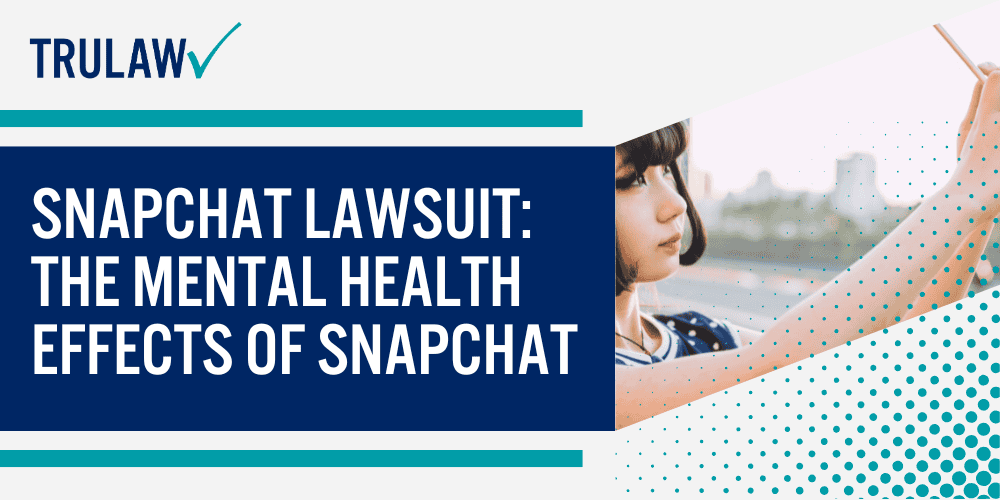
Impact on Youth Mental Health
Snapchat has faced legal action alleging the app contributes to a youth mental health crisis.
The social media lawsuits posit that the platform’s design and algorithms may lead to mental health problems among its users, particularly teenagers.
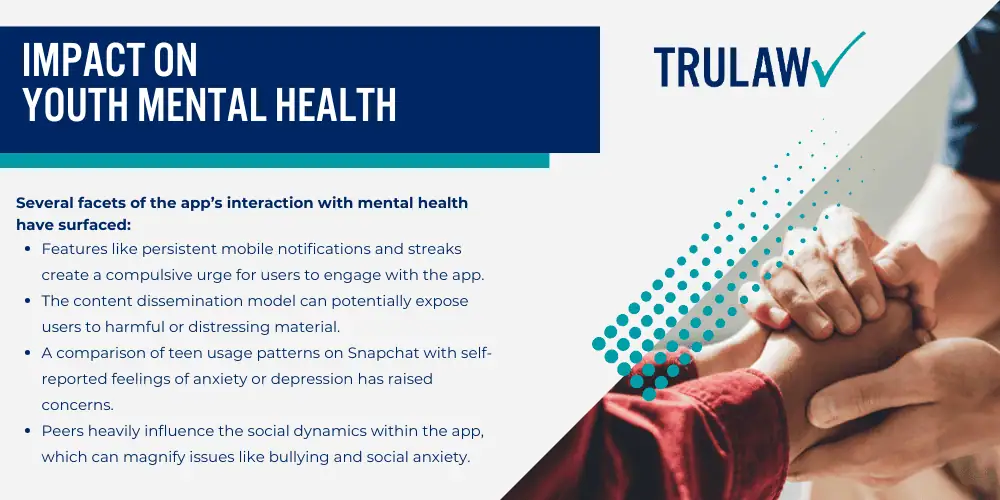
Several facets of the app’s interaction with mental health have surfaced:
- Features like persistent mobile notifications and streaks create a compulsive urge for users to engage with the app.
- The content dissemination model can potentially expose users to harmful or distressing material.
- A comparison of teen usage patterns on Snapchat with self-reported feelings of anxiety or depression has raised concerns.
- Peers heavily influence the social dynamics within the app, which can magnify issues like bullying and social anxiety.
Comparing Other Social Media Companies
Snapchat is one of many social media platforms implicated in negatively affecting mental health.
However, comparisons draw distinctions:
- Social media apps like Facebook and Instagram have been similarly criticized for their mental health impacts.
- Each app has unique features but shares common threads, such as promoting constant connectivity and content consumption.
- Studies and lawsuits often group these companies together when discussing social media and mental health.
- Legal arguments frequently cite how Snapchat and other social media platforms are engineered to keep users hooked, a trait shared across the industry.
Addiction and Overuse Concerns
Concerns of addiction and overuse are central to the claims against Snapchat.
These are characterized by:
- An emphasis on the frequency and duration of app usage, often to the detriment of other activities.
- The role of algorithm-driven content feeds in cultivating habitual use.
- How social media companies implement design decisions that encourage prolonged use patterns.
- Reports that users, especially teens, find it difficult to disengage from social media platforms despite negative consequences to their well-being.
Case Details and Allegations in the Snapchat Lawsuit
The Snapchat lawsuit revolves around serious allegations concerning fentanyl overdoses that have affected young people.
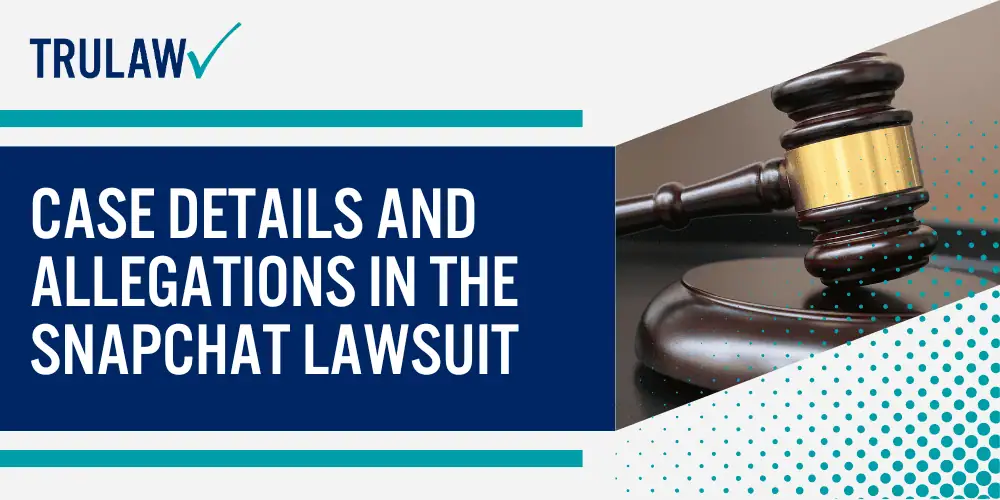
The legal claims are lodged against the platform for its purported role in these outcomes.
Fentanyl Overdose Cases
Entities and individuals claim that third-party drug dealers used Snapchat to sell fentanyl-laced counterfeit pills to young adults, which resulted in multiple fentanyl overdoses and wrongful deaths.
These overdose cases involve:
- Young individuals allegedly suffered fentanyl overdoses.
- Deals made through Snapchat that led to illicit fentanyl purchases.
- Family plaintiffs are raising a dozen claims against the social media platform.
- Similar claims were filed in different jurisdictions, indicating a broader concern.
Plaintiffs’ Position and Claims
The lawsuit includes the position that Snapchat failed in its duty to protect users from harm by enabling drug dealers to connect with potential buyers.
Among the plaintiffs’ claims are that:
- Snapchat’s design facilitated illegal transactions.
- The company did not take sufficient measures to prevent drug sales.
- The plaintiffs are seeking justice and compensation for the losses suffered.
- There is a call for Snapchat to improve safety measures to protect younger users.
Defendant’s Counterarguments
Snapchat’s parent company, Snap Inc., maintains its innocence and is prepared to fight allegations ranging from product defects to negligence and wrongful death.
Their counterarguments suggest that:
- Accusations may be factually flawed.
- Snap Inc. has policies and features in place to deter illegal activity.
- The company is working proactively to remove drug-related content.
- A federal judge has already dealt with similar claims, invoking questions about the validity of the lawsuits.
California judge rules on such matters have varied, with some favoring the plaintiffs while others supporting the defenses as substantial.
Snapchat Lawsuit: Legal Framework and Rulings
Snapchat’s legal challenges provide a prism through which the evolving legal landscape of social media litigation can be viewed, reflecting the tension between user privacy concerns and technology companies’ operational prerogatives.
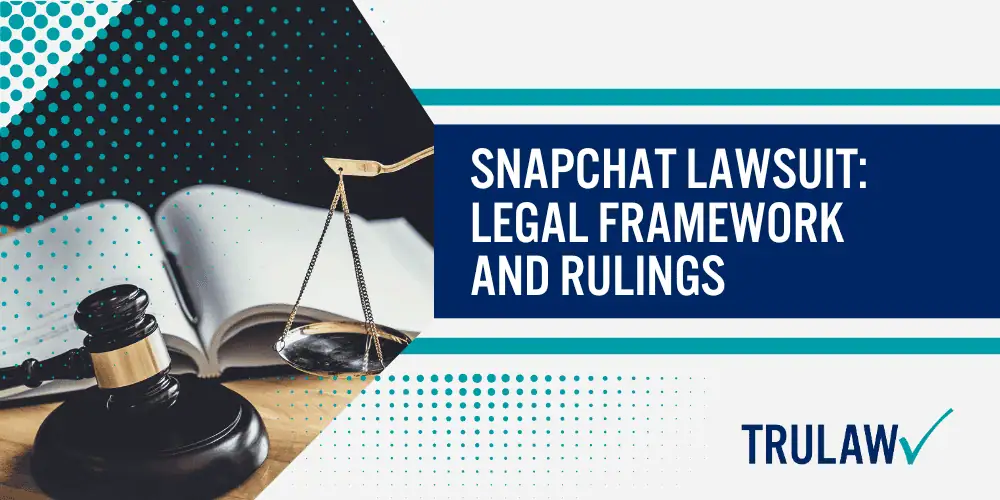
Communications Decency Act Influence
The Communications Decency Act (CDA) has long served as a broad legal tool for online platforms, offering a shield against liability for content posted by users.
Key points to note include:
- The CDA’s Section 230 is the centerpiece of this defense, protecting companies from being treated as the publisher or speaker of information provided by another content provider.
- California state and federal judge rulings have refined and challenged these protections’ extent.
- Recent rulings highlight the act’s influence in content moderation suits where platforms exercise editorial discretion.
- Riff’s decision allowing cases to proceed even with the CDA’s protections can expose social media platforms to more similar claims.
Recent Court Outcomes
In California, a judge’s ruling on Snapchat’s biometric data use sheds light on the boundaries of the CDA.
To illustrate the trend in recent court outcomes:
- Snapchat settled a $35 million lawsuit over user privacy allegations, where it was accused of unlawfully storing biometric data.
- This case bypassed the CDA protections, focusing instead on the violation of certain state laws.
- The ruling sets a precedent that could potentially nip content moderation suits in the bud if other courts follow suit.
- It raises questions on the classification of certain acts by social media companies, whether as editorial decisions or data policy violations.
Potential Impact on Future Lawsuits
As social media companies continue to face legal scrutiny, the outcomes of such lawsuits have a direct influence on future litigation.
Noteworthy implications include:
- Establishing a roadmap for future privacy-related cases against tech companies.
- Potentially curtailing CDA protections in instances where user data management is central to the complaint.
- Influencing policy and operational changes within social media companies to mitigate the risk of similar lawsuits.
- It will serve as a case study for legal professionals and judges in other jurisdictions, possibly prompting a more nuanced application of the CDA.
Social Media Governance
Entities like tech companies and individual internet users are seeking a balance between open communication and safe spaces in tackling the multifaceted issue of social media governance.
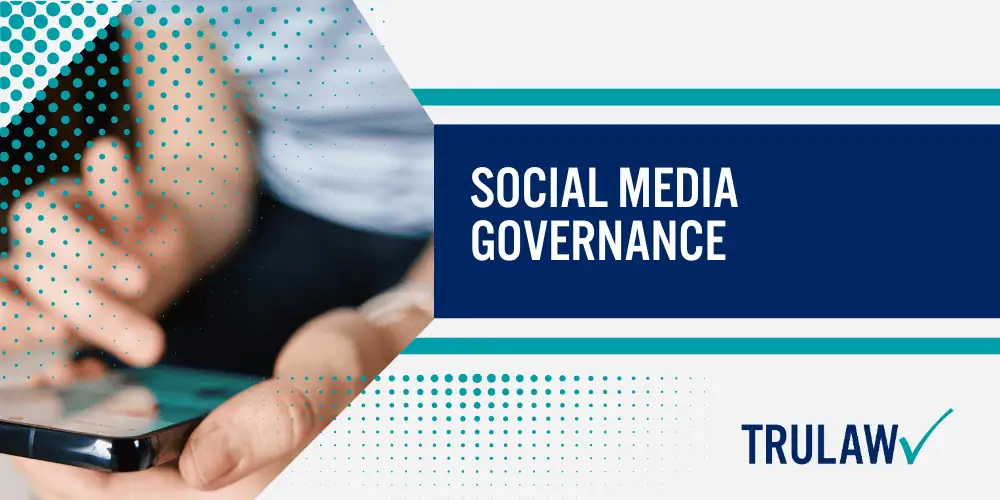
Policies are in flux to address content moderation, parental controls, and drug-related content.
Content Moderation Challenges
Content moderation suits are an increasing concern for platforms like Meta, which face pressure to monitor and regulate users’ content.
Here are the key challenges in content moderation:
- Distinguishing between free speech and harmful content.
- Managing the sheer volume of user-generated posts.
- Developing algorithms that can accurately identify violations.
- Balancing speed of response with the thoroughness of review.
Parental Control Measures
The generation of effective parental controls is imperative for platforms.
They must safeguard young internet users while navigating the fine line of personal autonomy.
Essential measures include:
- Age restrictions to prevent underage access.
- Tools allowing guardians to monitor activity and usage time.
- Customizable filters to block inappropriate content.
- Real-time notification systems for guardians about potential risks.
Anti-Drug Policies and Enforcement
Efforts to curb drug dealers’ activity on social networks have led to the creation of comprehensive anti-drug policies.
To effectively circumvent online drug sellers’ posted content, the following steps are vital:
- Proactive scanning tools that detect and remove drug-related content.
- Collaboration with law enforcement to investigate violations.
- Regular updates to policies to keep up with changing drug-related content trends.
- Educational materials for users regarding the dangers of engaging with drug sellers.
Snapchat's Impact on Users and Society
Snapchat, a prominent social media platform, has significantly influenced its user base, particularly among the younger population, while contributing to various complex issues within society.
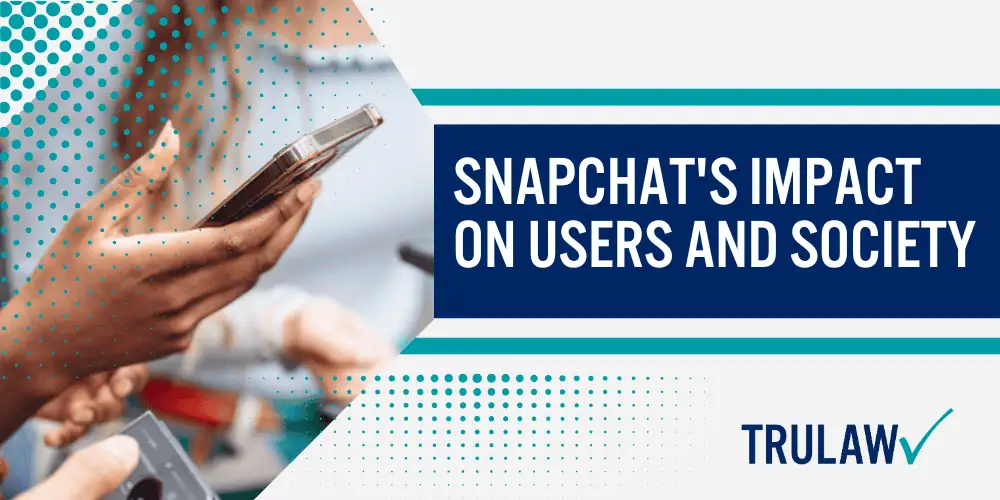
Influence on Young Users
Snapchat has become a staple in the digital diet of young users and teen users, weaving itself into the fabric of their social interactions.
The platform’s features, such as disappearing messages and image filters, have encouraged a particular style of communication.
Key Factors Influencing Young Snapchat Users:
- Snapchat’s image-centric design contributes to a dynamic where appearances are given high importance.
- The app encourages frequent use due to its ‘streak’ feature, which rewards daily interaction between friends.
- Some children allegedly use the app for peer approval, impacting their social development.
- Snapchat’s creative filters are popular among young users, influencing their perception of self-image.
Ties to Mental Health Disorders
Research suggests a correlation between extensive social media use, like Snapchat, and the development of mental health disorders, particularly relating to low self-esteem and body image concerns.
Connection Between Snapchat and Mental Health Challenges:
- Social comparison, often sparked by curated content on Snapchat, may lead to feelings of inadequacy and low self-esteem.
- The platform has been scrutinized for not filtering harmful content effectively, which could contribute to mental health issues.
- Eating disorders have been linked to exposure to idealized body images commonly shared on Snapchat.
- There is ongoing debate about whether companies, such as Snap, should hold Snap accountable for product and business decisions that may affect mental health.
Self-harm and Suicidal Ideation
Discussion surrounding Snapchat has raised concerns about its possible association with self-harm and suicidal ideation among its users.
The platform’s role in spreading content that could trigger or glorify such behavior is under scrutiny.
Areas of Concern With Snapchat Content:
- Reports have indicated instances where teen users encounter content related to self-harm on the platform.
- Parents and family members express anxiety over the accessibility of potentially harmful content to susceptible individuals.
- The demand for more rigorous content review mechanisms on Snapchat has increased among review sites and web forums.
- Advocates for mental health have urged for better oversight and the implementation of protective measures against content that could lead to self-harm or suicidal ideation among users.
Social Media Harm Lawsuits Frequently Asked Questions
-
Individuals affected by the privacy concerns addressed in the Snapchat lawsuit can submit a claim through the established settlement website.
Comprehensive steps for this process are detailed in the FAQs of the Snapchat Privacy Settlement, where claimants can find necessary forms and submission guidelines.
-
The timeline for the Snapchat settlement distribution is determined by the court’s schedule and the completion of the claim submission process.
From the official Settlement website, claimants can learn about key dates, including deadlines and distribution timeframes.
-
A privacy violation in this context refers to Snapchat collecting and storing users’ biometric data without obtaining proper consent.
Information on the specific allegations and legal definitions of these violations can be found in detailed resources about the Snapchat lawsuit’s implications.
-
To pursue legal action against Snapchat, the following steps are generally required: identifying the legal grounds for the lawsuit, filing a legal complaint, participating in the discovery process, and potentially engaging in settlement negotiations or a trial.
As reported in various Snapchat lawsuit updates, these stages are part of the ongoing legal proceedings related to privacy concerns.
-
Recent developments in Snapchat’s legal proceedings include the announcement of a settlement agreement and the subsequent claim submission phase for class members.
For the latest developments and their implications, interested parties should refer to updated news articles and official statements, like the information provided by NBC Chicago regarding the Snapchat lawsuit.

Managing Attorney & Owner
With over 25 years of legal experience, Jessica Paluch-Hoerman is an Illinois lawyer, a CPA, and a mother of three. She spent the first decade of her career working as an international tax attorney at Deloitte.
In 2009, Jessie co-founded her own law firm with her husband – which has scaled to over 30 employees since its conception.
In 2016, Jessie founded TruLaw, which allows her to collaborate with attorneys and legal experts across the United States on a daily basis. This hypervaluable network of experts is what enables her to share the most reliable, accurate, and up-to-date legal information with our readers!
Additional Social Media Harm Lawsuits resources on our website:
Here, at TruLaw, we’re committed to helping victims get the justice they deserve.
Alongside our partner law firms, we have successfully collected over $3 Billion in verdicts and settlements on behalf of injured individuals.
Would you like our help?
At TruLaw, we fiercely combat corporations that endanger individuals’ well-being. If you’ve suffered injuries and believe these well-funded entities should be held accountable, we’re here for you.
With TruLaw, you gain access to successful and seasoned lawyers who maximize your chances of success. Our lawyers invest in you—they do not receive a dime until your lawsuit reaches a successful resolution!
AFFF Lawsuit claims are being filed against manufacturers of aqueous film-forming foam (AFFF), commonly used in firefighting.
Claims allege that companies such as 3M, DuPont, and Tyco Fire Products failed to adequately warn users about the potential dangers of AFFF exposure — including increased risks of various cancers and diseases.
Depo Provera Lawsuit claims are being filed by individuals who allege they developed meningioma (a type of brain tumor) after receiving Depo-Provera birth control injections.
A 2024 study found that women using Depo-Provera for at least 1 year are five times more likely to develop meningioma brain tumors compared to those not using the drug.
Suboxone Tooth Decay Lawsuit claims are being filed against Indivior, the manufacturer of Suboxone, a medication used to treat opioid addiction.
Claims allege that Indivior failed to adequately warn users about the potential dangers of severe tooth decay and dental injuries associated with Suboxone’s sublingual film version.
Social Media Harm Lawsuits are being filed against social media companies for allegedly causing mental health issues in children and teens.
Claims allege that companies like Meta, Google, ByteDance, and Snap designed addictive platforms that led to anxiety, depression, and other mental health issues without adequately warning users or parents.
Transvaginal Mesh Lawsuits are being filed against manufacturers of transvaginal mesh products used to treat pelvic organ prolapse (POP) and stress urinary incontinence (SUI).
Claims allege that companies like Ethicon, C.R. Bard, and Boston Scientific failed to adequately warn about potential dangers — including erosion, pain, and infection.
Bair Hugger Warming Blanket Lawsuits involve claims against 3M — alleging their surgical warming blankets caused severe infections and complications (particularly in hip and knee replacement surgeries).
Plaintiffs claim 3M failed to warn about potential risks — despite knowing about increased risk of deep joint infections since 2011.
Baby Formula NEC Lawsuit claims are being filed against manufacturers of cow’s milk-based baby formula products.
Claims allege that companies like Abbott Laboratories (Similac) and Mead Johnson & Company (Enfamil) failed to warn about the increased risk of necrotizing enterocolitis (NEC) in premature infants.
Here, at TruLaw, we’re committed to helping victims get the justice they deserve.
Alongside our partner law firms, we have successfully collected over $3 Billion in verdicts and settlements on behalf of injured individuals.
Would you like our help?
